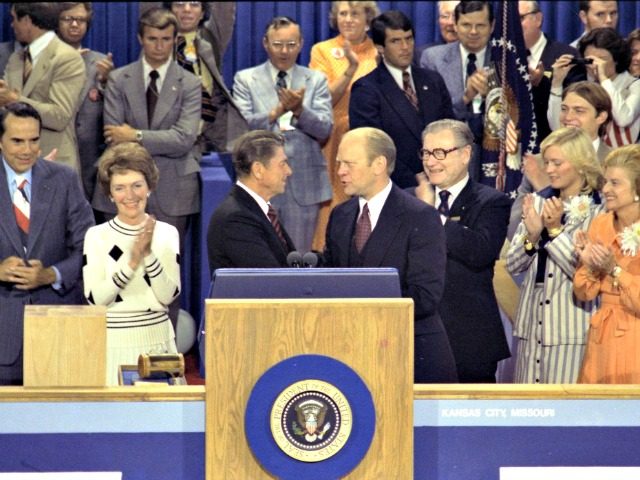The man at President Ronald W. Reagan’s side for 13 years and who walked with him out of the White House Jan. 20, 1989, told Breitbart News he understands why Sen. Ted Cruz (R.-Texas) failed to endorse the GOP’s nominee for president Donald J. Trump Wednesday at the Republican National Convention in Cleveland, despite his pledge to do so.
“As for that pledge, all I can tell you is that if it was my wife, who was attacked or somebody else, like my father, I probably would have said the heck with the pledge, he just negated it,” said Jim Kuhn, who joined Reagan’s team in 1975 as an advance man for the former California governor’s run for the GOP’s 1976 nomination for president against President Gerald R. Ford. In the Reagan White House, Kuhn ran the president’s schedule and by way of a direct phone line was the liaison between First Lady Nancy Reagan and the rest of the staff.
Cruz made it very clear this morning to the Texas delegation that is why he did not endorse Trump, even though Trump gave him a prime time slot at the convention, Kuhn said. “He said: ‘You attack my wife, attack my family, attack my father, that destroyed that commitment.’ I respect him for that. I do.”
Kuhn said on the other hand, it was completely out of line for Cruz to go on for 23 minutes, when he was told he had 10 minutes in a move that pushed Trump‘s pick for vice-president Indiana Gov. Mike Pence out of prime time.
“Yeah, he went too long and it seemed like he was being very subjective and repetitive,” he said.
“I remember in 1992–I know when your guy is pushed out of prime time it is very upsetting–for Bush, the old man’s reelection in Houston, and Pat Buchanan spoke forever,” he said. “Reagan followed Buchanan and didn’t get on until 11:10 or 11:15 at night Eastern Time. It is irritating. Very irritating.”
Kuhn said many people are comparing the rancor and infighting at this year’s convention with 1976, but there is no comparison.
After President Richard M. Nixon‘s 1974 resignation, President Gerald R.Ford, who had been the House Minority Leader before becoming Nixon’s vice-president, decided to run for president in his right. Reagan campaigned for Goldwater in 1964 and made his own run for president in 1968. Ford’s run to keep his job in 1976 might have seemed natural enough, but it butted into Reagan’s own trajectory. When Reagan finished his two-terms as governor in 1975, he was the most prominent Republican in the country who was not Ford.
“Reagan was making a real serious challenge to Ford,” he said. “There is nothing like it that Trump has faced, so far.”
In Kansas City in 1976, the convention was absolutely critical as he knew it was going down to the wire, he said.
“The Ford people were very dug in for Ford, even though Ford had never been an elected president,” he said. “There were a lot of people, who did not want Reagan around. But, Reagan just felt so strongly and he had national support from a lot of states. There was a fine line between Ford and Reagan, a very fine line.”
As a young advance man, Kuhn said he was in the hall when Ford called Reagan down to the stage for a display of party unity.
Earlier in the night, Reagan gave an address that healed wounds and left no mistake that Reagan was going to be loyal to the Ford reelection campaign, Kuhn said. Then, after Ford was finished his acceptance address, he called Reagan to the stage and allowed him to speak again. “Unfortunately for Ford, though, as great as that night was to bring everybody together and eloquence that Reagan did it with–the positiveness, with his great optimism and everything–the Republicans, the Ford people and Ford himself going forward allowed it to unravel. A lot of people don’t know, the Ford people really didn’t want the Reagan people around. They didn’t think they needed the Reagan organization.”
Ford needed either Ohio or New York to win, he said. “He lost both and lost the election.
It was unspoken in the Reagan camp that if Ford lost, Reagan had a shot in 1980,” he said.
“There was no question about that, but Ronald Reagan never spoke those words and we didn’t either,” Kuhn said. “If Ford had won and then wanted to run again in 1980, history would have been changed dramatically–after Ford lost the question became: Can Reagan remain viable for the next four years.”
Even though the country was hurting, home and abroad, it was very hard to beat the incumbent, he said. “It was a long, hard road for Reagan to beat Carter.”
Kuhn said Cruz needs to look ahead. “If Hillary Clinton does win, it is going to be next to impossible for the Democrats to get four terms in a row. I’ve never seen it in my lifetime. People like Ted Cruz, need to be viable and he is in a position of strength in the United States Senate–he needs to be visible and substantive and he’ll be in good shape.”
If Trump wins, that changes the dynamic,” he said. “He’s going to be in the Senate for while.”
Kuhn said Reagan’s advice to Trump would be for Trump to be positive.
“Stay away from the negatives,” he said. “Put out your agenda and your belief systems, so people know why you are seeking that office and what they’re going to get with you in that office. Talk about yourself. Talk about what drives you, what guides you–and don’t attack, don’t attack.”

COMMENTS
Please let us know if you're having issues with commenting.